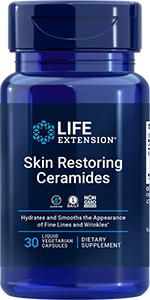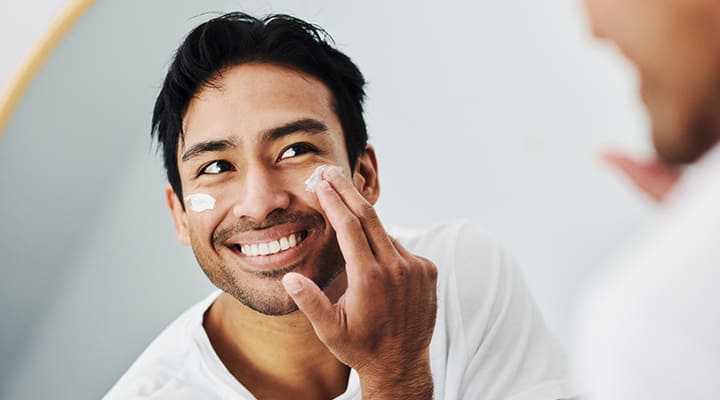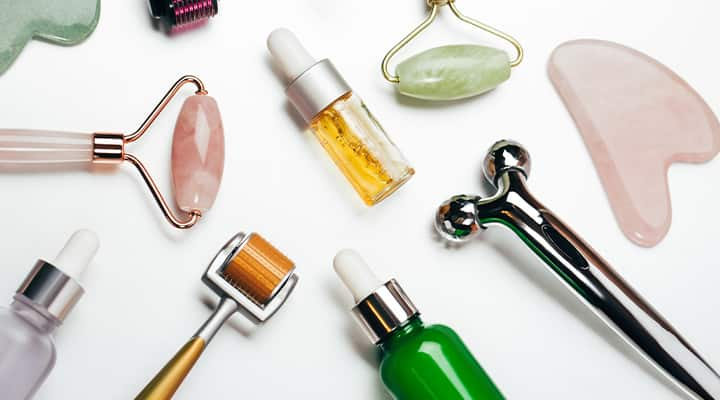
Winter Skin Care Tips You Need This Season
Published: January 2023
Tell us if this sounds familiar: Wintertime hits, and your skin starts to struggle. It dries out and feels paper thin. What gives? Why does your skin feel smooth, soft, and supple during the warmer months…yet dry in the winter?
In this article, you’ll learn why you struggle to support your skin during the winter, how to take better care of your skin, and what your wintertime skincare routine should look like.
Let’s go!
What happens to your skin in the winter?
First, let’s talk about what happens in the winter weather. You don’t need us to tell you that the temperature drops. But it goes further than the cool air. Humidity — which refers to the amount of water vapor in the air — also drops. Moisture in the air helps to hydrate your skin. So, when the humidity goes down, dry air increases, and your skin doesn’t like it! The central heating inside your home certainly doesn’t help, either.
Winter is also typically windier, and this too can have an impact on your skin. Exposure to wind can cause the outer layer of skin to become more vulnerable to UV exposure.
Ultimately, environmental factors disrupt the normal skin barrier.
This is why, during the wintertime, your skin care routine might be more involved than during other seasons.
How to take care of your skin in winter: 15 tips
So, you now know why winter can be so harsh on your skin health. What can you do about it? Try these 15 winter skin care tips.
1. Keep using sunscreen
You should ideally be wearing sunscreen every single day, year-round. Yes, even in the winter and even when it’s cloudy! UV exposure can still affect your skin.
Also, be more mindful of reapplying it diligently — every two hours is a safe rule of thumb. The strong winter winds can wear away your sunscreen, making it less effective. Plus, sunscreen can help hydrate your skin. Bonus!
2. Stay far away from tanning beds
You might be thinking, “Meh, if I can’t tan outside, then I’ll just hit the salon!” You might want to reconsider. According to the American Academy of Dermatology Association, tanning beds increase the potential for serious skin health concerns down the road—and they can leave your skin wrinkled and less firm.
Plus, if you hop into a tanning bed with dry skin, it’s going to suck the moisture from the top layers and leave your skin even more dehydrated. Yikes.
Oh, and by the way, that whole concept of using a tanning bed to get a “base tan” is a complete myth. A tanning bed will not stop you from turning into a tomato on your big winter vacation!
3. Avoid long, hot showers
We know, we know. One of the best ways to warm up during the frigid winter months is with a nice, long, steaming hot shower. But you might want to turn the dial down because it could be making your wintertime skin challenges harder.
The University of Utah study says that the hotter your shower water is, the more moisture and natural oils it’s going to suck out of your skin. And the longer you stay under the running water, the worse it’ll be. In other words, already dry skin will get dryer.
So, aim to stick with shorter, lukewarm showers — no matter how nice that scalding hot water feels.
4. Moisturize daily, especially when your skin is wet
This is one of our favorite winter skin care tips because not a lot of people know about it! After you wash your hands or face or take a shower, the water strips away the oils in and on your skin. And these oils help lock in moisture. So, you need to replace them. This is why moisturizing right after washing is a must in order to hydrate your skin during the winter.
Here’s one secret tip: Use moisturizer while your skin is still damp! Right out of the shower, your pores are open. Plus, damp skin can better lock in the moisturizer. This means you’re left with skin that’s softer and stays that way longer.
5. Know your ingredients
It’s time to get comfortable reading the labels! Some ingredients, you’ll want to avoid, such as alcohol (except for hand sanitizer), fragrances, retinoids, and alpha-hydroxy acid (AHA). They’re going to make dry skin worse.
On the other hand, jojoba oil, shea butter, glycerin, humectants, and hyaluronic acid get the green light. If your moisturizer contains any of these, you’re in good shape. (Fun fact: Your body actually produces hyaluronic acid naturally, and it’s very good at retaining water. So, when you use hyaluronic acid on your skin, it can keep it healthy-looking and even reduce the appearance of fine lines and wrinkles.)
6. Winterize your skincare routine
During winter, many of us have a decline in our skin’s moisture-retaining ceramide levels. Since ceramides are key for maintaining skin hydration and overall health, a ceramide supplement (as well as topical products with ceramides) can help keep your skin dewy when the temperature dips.
Aside from specific ingredients, there are types of products that can help your wintertime skin (or not). Ointments and cream are better than lotion, as are emollients. In the colder months, you might also prefer an oil-based cleanser over a water-based one. And keep it fragrance-free! As an added bonus, you’ll find that many of these same products are great for fighting the signs of aging.
Pro tip: Stick with non-comedogenic products. This is a fancy term that simply means the product won’t clog your pores.
7. Maintain the humidity indoors
Maintaining the proper humidity means you’ll have an easier time caring for your skin in the winter months. Set it somewhere between 30% and 50%. If the air is particularly dry, a humidifier can also help to keep dry skin at bay.
Explore Our Best Skin Care Products
8. Choose your moisturizer wisely
Whereas you might use lighter, oil-free moisturizers in the summer because you’re dealing with sweaty or oily skin, it’s the opposite in the winter. Now’s the time to opt for a moisturizer that’s a little thicker and heavier.
9. Cut back on exfoliants and scrubs
Products that exfoliate can actually cause very tiny tears in your skin, hurting the natural skin barrier and making you even more vulnerable to the harsh elements of the winter season. That’s right — scrubbing off dry skin with an abrasive cleanser will make it worse, no matter how much you moisturize. Mild exfoliants might be safe, though. That’s why it’s so important to choose a quality brand and read labels carefully. Before you exfoliate, look into how exactly the product works, how intense it is, and what the ingredients are. (For example, you might want to avoid sugar scrubs, while an exfoliant with soothing peppermint oil and hydrating seaweed is a better bet.)
10. Time your skincare products right
Morning is a great time for a cleanser and applying your broad-spectrum SPF. At night, lock in the moisture with a richer cream and consider a hydrating face mask once a week.
11. Hydrate on the inside, too
Our best winter skin care tips aren’t limited to the outside of your body. No winter skincare routine will compensate for a lack of drinking water. The best way to gauge your hydration is by the color of your urine. If it’s dark yellow, drink up. The clearer it is, the more hydrated you are.
You might also consider something like a collagen supplement, which is beneficial for your skin, hair, and nails and nourishes you from the inside out.
12. Consider using a humidifier
Not only can the dry outdoor air do a number on your complexion, but depending upon your home’s climate control system, indoor heat can bring its own challenges. Running a humidifier in your bedroom can help make that brittle air just a bit more balmy.
13. Wear gloves
This goes for both when you’re exposed to the outdoor weather and when you’re washing dishes. If you don’t wear rubber gloves for dishwashing, then keep a bottle of moisturizer next to the sink so you’ll remember to hydrate your skin.
Pro tip: If you use haircare styling products, try to apply them with gloves. If not, wash and moisturize your skin after using them, too, since they can contain ingredients that dry you out.
14. Swap out your wardrobe
If your skin is dry, anything that rubs against it might only make it worse. In the winter, opt for loose, flowing, natural fabrics to reduce. Wool is soft and warm, and silk makes a great base layer. According to Fashion Institute of Technology professor Ajoy K. Sarkar, cotton, linen, cashmere, and hemp are ultra-comfortable on the skin.
15. Switch out your laundry detergent
If your detergent has any harsh ingredients or artificial fragrances, it might be making it harder to keep your skin healthy. Opt for something formulated for sensitive skin, without any intense chemicals. In fact, one study found that people who washed their clothes with a non-ionic, additive-reduced laundry detergent saw an improvement in the quality of their skin.
The best winter skincare routine
If we had to sum it up, your wintertime skincare routine might look like this:
- Start your morning off with a gentle cleanser, SPF, lip balm, and a thicker but not-greasy ointment or cream.
- Reapply SPF throughout the day. Roughly every two hours is a safe bet.
- Drink plenty of water throughout the day and keep an eye on the color of your urine to gauge your level of hydration. Consider supplementing with collagen.
- Keep a humidifier running to maintain the proper humidity level.
- End the night with a gentle cleanser (exfoliate with caution!), thicker night cream, and a face mask, if needed. Don’t forget eye cream for that extra-delicate skin. Moisturize generously!
Of course, tailor this so it fits you. For instance, some people might like using a face mask more than once a week. Others will only use a cleanser at night because twice a day makes it harder to prevent against dry skin.
Dry winter skin, be gone! Experiment with different routines and approaches, follow these winter skin care tips, and watch how your skin improves — even in the chilly weather. With a little trial and error, you’ll find the perfect strategy for you, and your skin cells will be so happy.
References
- Coons, C. “Itchy, dry skin this winter? These tips from dermatologists may help.” UC Davis Health. December 2022. https://health.ucdavis.edu/news/headlines/itchy-dry-skin-this-winter-these-tips-from-dermatologists-may-help-/2022/12
- Gupta RC, et al. “Hyaluronic Acid: Molecular Mechanisms and Therapeutic Trajectory.” Front Vet Sci. June 2019. https://www.ncbi.nlm.nih.gov/pmc/articles/PMC6603175/
- Kandil SM, et al. “Magnesium ascorbyl phosphate vesicular carriers for topical delivery; preparation, in-vitro and ex-vivo evaluation, factorial optimization and clinical assessment in melasma patients.” Drug Deliv. December 2022. https://www.ncbi.nlm.nih.gov/pmc/articles/PMC9040897/
- Kiriyama T, et al. “Residual washing detergent in cotton clothes: a factor of winter deterioration of dry skin in atopic dermatitis.” J Dermatol. October 2003. https://pubmed.ncbi.nlm.nih.gov/14684951/
- Ishikawa J, et al. “Dry skin in the winter is related to the ceramide profile in the stratum corneum and can be improved by treatment with a Eucalyptus extract.” J Cosmet Dermatol. March 2013. https://pubmed.ncbi.nlm.nih.gov/23438136/
- Mackey S. “Relieving Winter Skin Discomfort.” Phys Sportsmed. January 1995. https://pubmed.ncbi.nlm.nih.gov/29278095/
- Seal AD, et al. “Coffee with High but Not Low Caffeine Content Augments Fluid and Electrolyte Excretion at Rest.” Front Nutr. August 2017. https://www.ncbi.nlm.nih.gov/pmc/articles/PMC5563313/
- Tang, J MD, Hanke, C MD, MPH, FACP. “Against the Wind.” Sun & Skin News. March 2021. https://www.skincancer.org/blog/against-the-wind/#:~:text=Being%20exposed%20to%20wind%20can,effects%20of%20the%20stratum%20corneum
- Vollmer DL, West VA, Lephart ED. ”Enhancing Skin Health: By Oral Administration of Natural Compounds and Minerals with Implications to the Dermal Microbiome.” Int J Mol Sci. October 2018. https://www.ncbi.nlm.nih.gov/pmc/articles/PMC6213755/
- “Dermatologists’ Top Tips For Relieving Dry Skin.” AAD. https://www.aad.org/public/everyday-care/skin-care-basics/dry/dermatologists-tips-relieve-dry-skin
- “Hot Showers Can Dry Out Your Skin.” The Scope. February 2021. https://healthcare.utah.edu/the-scope/shows.php?shows=0_8qzmzdxl#
Like what you read?
Please subscribe to get email updates on this blog.










